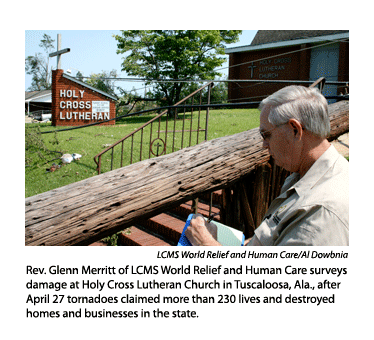By Kim Plummer Krull
Even a disaster-response veteran like LCMS World Relief and Human Care’s (WR-HC) Rev. Glenn F. Merritt says the devastation after the deadly tornado in Joplin, Mo., surpasses what he has seen after most other disasters.
“This will be an exceptionally long-term recovery,” said Merritt, director of the Synod’s Disaster Response and a former police officer.
“The situation in Joplin is much more intense because so much infrastructure has been destroyed, so many homes, apartments, churches, schools and businesses,” Merritt said. “The magnitude of this destruction far exceeds what we respond to, with the possible exception of after Hurricane Katrina [in New Orleans] and after the tornado in Greensburg, Kan. Recovery is going to be measured in years — not weeks or months — because of the extent of destruction and loss of life.”
Merritt and WR-HC’s Rev. Carlos Hernandez arrived in the southwestern Missouri community on May 25, three days after the nation’s deadliest single tornado in more than six decades decimated a more than six-mile-long path through a highly populated area. The EF-5 twister killed at least 138 people, including two children, ages 6 and 8, from a member family at First Lutheran Church in nearby Neosho.
“There’s nothing left [where the tornado struck in Joplin],” said Hernandez, also a disaster-response veteran. “With other disasters, there has been something left that people can rebuild from and start over. But here, it was like the tornado was a powerful grinder that chopped up the debris so that nothing is left.”
One beacon of hope in the midst of the tragedy is Immanuel Lutheran Church, where two grants from WR-HC — an initial $25,000, plus another $57,075 — are helping Joplin’s only LCMS congregation reach out to the congregation’s families and the community. The gym at the church’s Martin Luther School has been transformed into a relief distribution center, providing food, clothing, a free medical clinic and pastoral care. The congregation also is scheduling stress relief and post-traumatic care for hurting families.
Contributions from WR-HC donors also enabled Immanuel to purchase gift cards to distribute to families for emergency assistance with temporary housing and other needs.
“Immanuel is a refuge, a place where people can come for help, and volunteers are sorting through clothing and stocking the makeshift medical clinic,” Hernandez said. “It’s a place where people can tell their stories and talk about the trauma of barely escaping with their lives, and people will listen.”
To watch video interviews with Merritt and Hernandez and see tornado damage in Joplin, visit www.lcms.org/disaster/tornado.
Lutheran Church Charities (LCC) is partnering with WR-HC and has volunteers and K-9 comfort dogs on the scene in Joplin. “It’s a really good program and is being very well received,” Merritt said of the LCMS Recognized Service Organization based in Addison, Ill.
LCC also is assisting in scheduling crews to help at the church. To volunteer, visit the LCC website at www.lutheranchurchcharities.org.
According to a June 1 report from Martin Luther School Principal Jeremy Schamber, the homes of more than 30 church and school families were destroyed or have severe damage, including the homes of four school teachers. The brother of teacher Brenda Cook died in the storm. Immanuel’s website also lists losses, including several church members who suffered personal injuries.
Schamber also reported that the church will need a new roof and that four of the school’s classrooms have “possible structural damage and deadly mold” and are closed to the public. The church parsonage also has damage and mold.
While in Joplin through May 29, Merritt and Hernandez worked with LCMS volunteers and Immanuel’s pastor, Rev. Gregory Mech, and church and school staff. They also met with pastors from two nearby LCMS congregations: Rev. James Schnackenberg of Good Shepherd Lutheran Church, Carthage, and Dr. William Doubek III of First Lutheran Church in nearby Neosho.
At least one member family at Good Shepherd, Carthage, lost their apartment in Joplin and is struggling to find another home in a city where much rental property has been destroyed.
“Aid and assistance are being offered to both churches and the families affected in Neosho and Carthage,” said Merritt, who planned to return to Joplin on June 3 to continue relief efforts.
While the Red Cross and other relief agencies work in Joplin, Merritt said the LCMS — through WR-HC, the LCMS Missouri District, Immanuel and other LCMS churches, partners and volunteers — offers a different response that provides for both immediate physical needs and spiritual support.
As the ministry of Immanuel Lutheran makes “a real impact” in its battered community, the LCMS response is important, Merritt said, “because it’s through the Gospel that those who are suffering will find long-lasting relief and peace.”
To make a gift to help with the LCMS response in Joplin:
- mail checks (noting “Tornado Disaster Relief” in the memo line) to LCMS World Relief and Human Care, P.O. Box 66861, St. Louis, MO 63166-6861.
- call toll-free 888-930-4438.
- Donate online (click here).
Kim Plummer Krull is a freelance writer and member of St. Paul’s Lutheran Church, Des Peres, Mo.
This story was produced by LCMS World Relief and Human Care.
Posted June 3, 2011

